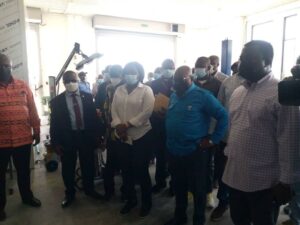Komenda Sugar factory to be operational in 2022 – President
 The President Nana Addo Dankwa Akufo-Addo says government is working tirelessly to get the defunct Komenda Sugar Factory operational by the first quarter of 2022.
The President Nana Addo Dankwa Akufo-Addo says government is working tirelessly to get the defunct Komenda Sugar Factory operational by the first quarter of 2022.
He said despite the poor planning into the operationalization of the factory by the National Democratic Congress (NDC) administration, his government had resolved to revive the factory to create jobs and enhance socio-economic development.
The President was speaking to the media in Cape Coast as part of his two-day working tour of the Central Region.
“The NDC’s strategy to build the factory without raw materials is like building a house from the roof without foundation. How does the house stand? President Akufo-Addo queried.
“The Trade and Industry Ministry is working hard to get a technical partner to run the facility and according to information from the Ministry, by the first quarter of 2022, the factory is going to start running again. The NPP cannot let the huge investment in the factory go down the drain,” the President reassured.
Currently, the $36-million factory located at Komenda in the Komenda-Edina-Eguafo-Abrem (KEEA) Municipality of the Central Region, had been taken over by overgrown weeds resulting from three years of lying idle.
The harsh weather conditions and the salty breeze from the Atlantic Ocean that lies about three kilometres from the factory have triggered rapid corrosion of the metallic parts of machinery at the factory.
President Akufo-Addo, also reiterated the government’s commitment to make Ghana a self-sufficient country capable of producing its own products.
To this end, he said the Government would continue its rapid industrialisation Agenda with the aim of transforming the structure of the Ghanaian economy from one dependent on production and export of raw materials to a value-added, industrialised economy.
He said the COVID-19 pandemic had exposed the need to expedite the process of moving Ghana to a situation beyond aid.
The key projects under the CARES (Obatanpa) Programme include: supporting commercial farming and attracting educated youth into commercial farming; building the country’s light manufacturing sector; developing engineering/machine tools and ICT/digital economy industries; and fast-tracking digitalisation.
Others include developing Ghana’s housing and construction industry; establishing Ghana as a regional hub; reviewing and optimising the implementation of government flagships and key programmes; and creating jobs for young people, as well as expanding opportunities for the vulnerable in society, including persons with disabilities.
Earlier, the President inspected a state-of-the-art Engineering laboratory and Workshop at the Cape Coast Technical University, (CCTU).
The facility, which sits on a one-acre land, seeks to give in-depth hands-on training to technical and vocational students to enable them fit directly into industry and for commercial purposes.
It comes with a two-year warranty and five-years after sales service from AVIC International Engineering Holding Corporation from China.
The facility is a collaboration between the Ministry of Education, the Council for Technical and Vocational Education and Training (COTVET) and AVIC International Engineering Holding Corporation.
The mechanical machines have a Computerized Numerical Machines (CNC) and Civil testing equipment for soil, wielding machines for frame extraction, different wielding machines and electric and electrical laboratory.
Source: GNA
